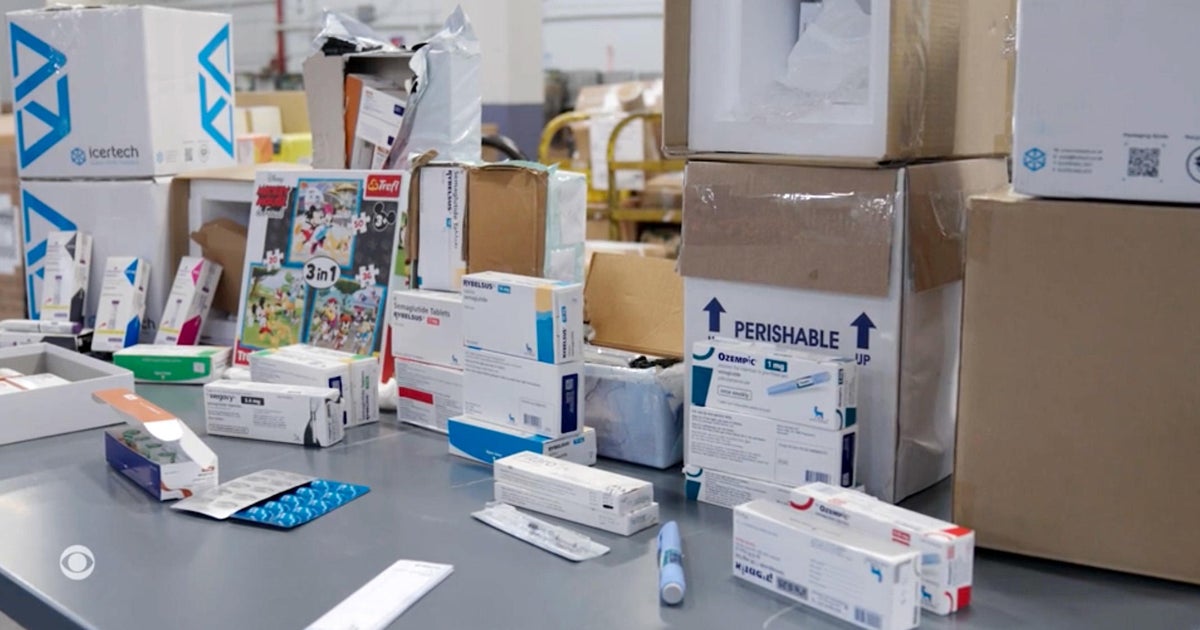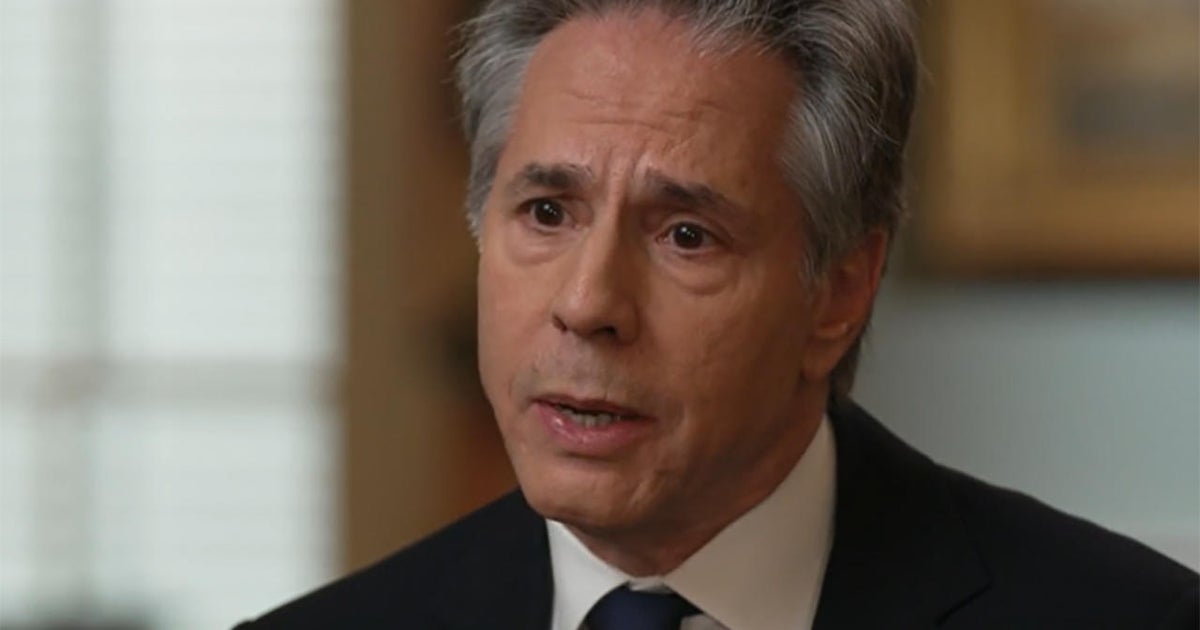60 Minutes investigates medical gear sold during Ebola crisis
Update: The Centers for Disease Control and Prevention (CDC), which maintains the Strategic National Stockpile, says it has "quarantined" the equipment featured in this report.
During the last major outbreak of the Ebola virus in 2014, more than 500 health care workers died of the disease, and something called Personal Protective Equipment became essential to preventing the deaths of even more. We're talking about gowns, gloves, masks and other gear designed to block the transmission of deadly bacteria and viruses. They're used every day in hospitals to protect doctors, nurses, and patients. But Ebola was so lethal, it raised the stakes enormously. If the protective equipment fails, infectious bodily fluids can get through -- a problem known as "strike-through." At the height of the Ebola outbreak, we received a tip that a major American manufacturer had knowingly provided defective protective equipment to health care workers in the U.S. and abroad. It's a serious accusation that had never been publicly examined until we first broadcast this story last year.
If there's one thing that became evident during the Ebola outbreak of 2014, it's that Personal Protective Equipment, properly used, could mean the difference between life and death. You probably remember the tragic images from West Africa, and the workers in biohazard suits trying to help without getting infected themselves.
[Nurses in Liberia praying: May you help us to be a blessing to our patients...]
Certain types of gowns were also used during the outbreak. The nurses at this hospital in Liberia used gowns and full-body suits to protect themselves after two of their top doctors died of the disease.
Every day in the U.S., doctors and nurses rely on some of the same gowns the Centers for Disease Control recommended for Ebola. One of them is the MICROCOOL surgical gown, made by Halyard Health, which sells about 13 million gowns a year worldwide, including a quarter of the U.S. market. The MICROCOOL gown is supposed to provide the highest level of protection available against blood-borne bacteria and viruses. Its label says it meets a rigorous industry standard known as AAMI Level 4 which means it's impermeable, so that blood containing viruses like hepatitis and HIV won't get on surgeon's skin during an operation. There's just one problem.
Anderson Cooper: What was wrong with the Level 4 gowns?
Bernard Vezeau: They would leak. They would leak. When we pressure tested them, especially in the seams.
Bernard Vezeau was the global strategic marketing director for MICROCOOL and other products from 2012 to early 2015. He worked for Halyard Health, which was part of the Kimberly-Clark corporation until November 2014. When two nurses at a Dallas hospital became infected after caring for a patient with Ebola, Vezeau says he was relieved the nurses hadn't been using MICROCOOL gowns, but he was concerned by the way the company went into high gear to sell the product.
Anderson Cooper: These gowns were being recommended for use with Ebola.
Bernard Vezeau: Aggressively being recommended.
Anderson Cooper: In what way aggressively?
Bernard Vezeau: We put a full court press to drive MICROCOOL sales. We told hospitals to stock up on our MICROCOOL products. We told 'em to have at least 8 to 12 weeks of product on hand. And that's when things became very difficult for me.
Difficult because Vezeau says he knew the gowns were not consistently meeting industry standards.
Anderson Cooper: There's a test for this, right?
Bernard Vezeau: There is a test. And it's conducted in outside facilities.
Anderson Cooper: So did your gowns consistently pass this test?
Bernard Vezeau: No, they did not.
Anderson Cooper: Was the FDA aware of this? Were they notified?
Bernard Vezeau: No, not that I'm aware of.
Anderson Cooper: Were customers warned?
Bernard Vezeau: No. Customers were not warned either.
Anderson Cooper: Why not?
Bernard Vezeau: Well, because Kimberly-Clark knew that if they-- they told customers, it would cost us a lot of business.
Michael Avenatti: They didn't tell the public. They didn't tell the FDA. They didn't tell physicians. They told no one. They kept selling the gown to the tune of millions of dollars every month.
Michael Avenatti is a California attorney who represents hospitals that are suing Halyard Health and Kimberly-Clark for fraud. He showed us this report by an independent, certified laboratory that tested the sleeves of MICROCOOL gowns in December 2012 at the request of one of Kimberly-Clark's competitors, Cardinal Health.
Michael Avenatti: At the time, Cardinal and Kimberly-Clark were in litigation against one another. And Cardinal had these gowns tested and, in fact-- the results were disastrous for Kimberly-Clark.
Anderson Cooper: What do you mean, "disastrous?"
Michael Avenatti: Well, if you look through the report, you'll see that 77 percent of the gowns that were tested failed.
Anderson Cooper: Seventy-seven percent?
Michael Avenatti: Seventy-seven percent.
At hospitals like UF Health in Jacksonville, Florida, we found surgeons who told us they repeatedly experienced strike-through, with blood getting through their gowns and onto their skin. Some surgeons were so upset about it they took pictures of their bloody arms and gowns and sent them to the company.
Anderson Cooper: Did you receive complaints from nurses, from surgeons at all?
Bernard Vezeau: On these gowns?
Anderson Cooper: Yeah.
Bernard Vezeau: Oh, frequently. On a very frequent basis.
Anderson Cooper: What kinda complaints?
Bernard Vezeau: Oh, complaints of strike-through, sleeves falling off, ties falling off.
Anderson Cooper: Sleeves falling off.
Bernard Vezeau: Sleeves falling off. Sleeves falling off during a procedure.
Anderson Cooper: Were you at meetings where these problems were discussed?
Bernard Vezeau: Every time. We were the ones who were telling senior management the problems that we were having.
Anderson Cooper: And what was their response?
Bernard Vezeau: Well, it's-- I remember the response one time from the COO was, "Nobody really cares about this. Nobody really cares about surgical gowns."
Chris Lowery: Yeah, that's just not true.
Chris Lowery is the COO, Vezeau was talking about, the chief operating officer of Halyard Health.
Anderson Cooper: Did you sell protective equipment for Ebola that you knew was defective?
Chris Lowery: No. And, frankly, I think the allegations aren't based in the facts.
Anderson Cooper: You're saying they're completely false?
Chris Lowery: Yes. We get less than one complaint for every million gowns sold. And even more so is we've never received even one report of a health care professional contracting an infection as a result of a flaw in our product.
Lowery says Bernard Vezeau didn't raise his concerns until after he left the company; Vezeau says he was fired because he was vocal about the problems. The company also questions the motives of this man, Keith Edgett, the former head of research and engineering for the gowns. In this video deposition, Edgett expresses the same concerns as Vezeau about what was going on at the company.
[Keith Edgett: I believe that they were putting customers in harm's way, and I was struggling with that.]
Anderson Cooper: I want to show you the results of a test performed by Intertek Labs. It shows that 77 percent of your MICROCOOL gowns failed one or both of the sleeves.
Chris Lowery: Yeah.
Anderson Cooper: Seventy-seven percent is a lot.
Chris Lowery: Anderson, it's very important to put this Cardinal test data into context. First, extreme outlier test results. We had never seen test data that reflected anything like this before or, for that matter, since.
Halyard showed us its own test results from independent laboratories. The reports show the sleeves passed some of the time, and failed at others, but Chris Lowery says they passed far more than they failed, and when they failed it was at much lower rates than the Cardinal test suggests.
Anderson Cooper: For the test in February 13, 18 out of 85 samples fail. That's 21 percent.
Chris Lowery: We have to look at a test failure in the context of all the tests that are passing.
Anderson Cooper: But you have failures in the product. You're still selling the product. And you don't inform the FDA and you're not informing customers?
Chris Lowery: It's important to understand that the-- no manufacturing process is perfect. You take that into...
Anderson Cooper: But these failures were above the industry standard. You're allowed a certain amount of failures. When you actually fail a test, though, that's above the failure rate that's already built in.
Chris Lowery: And the testing that we completed after the Cardinal testing, we believe that we were fully compliant with our requirements for the product as it had been cleared.
Michael Avenatti: Is that what he told you?
Anderson Cooper: Yeah.
Michael Avenatti: Evidently he forgot the 11th commandment.
Anderson Cooper: Which is?
Michael Avenatti: Do not lie to 60 Minutes.
The company had shown us this March 2013 lab report as part of its proof the gowns passed the test. But Attorney Michael Avenatti says that's not what really happened.
Michael Avenatti: They claim to have submitted 79 samples and 75 passed.
Anderson Cooper: They said they passed, yeah.
Michael Avenatti: Well, they didn't pass; they failed because they didn't submit 79 samples. They submitted 85 samples and, in fact, six of the samples weren't even tested because the sleeves were so bad. The lab took 'em outta the package and they were so bad that they didn't even test 'em because it was obvious what was going to happen.
Anderson Cooper: And they didn't include that in as failures?
Michael Avenatti: No, they didn't. And, in fact-- I mean, I brought the document that shows it. It's a spread sheet prepared internally at Kimberly-Clark.
Anderson Cooper: "Six failed, not tested due to unsealed seams." Lot fails. You're saying this is an example of fuzzy math?
Michael Avenatti: No, this isn't fuzzy math; this is fraud.
When we asked Halyard about this, the company acknowledged it hadn't told us about those untested samples but denied it was trying to deceive us. The company says even if a sleeve seam fails, the risk of a doctor or nurse getting infected is extremely low.
Chris Lowery: They'd have to have some type of cut that would allow transmission. The defect would have to be in that exact place. The surgeon would have not covered the cut or abrasion as they should have per their procedure. There's so many factors that have to align for that to occur.
Sherry Wren: I think it's really easy for him to say that. But he's not the guy doing it.
Dr. Sherry Wren is a vice chair of surgery at Stanford University School of Medicine.
Sherry Wren: The bottom line is, is he going to stand there and volunteer to let me paint some Hepatitis C blood on his arms and on his stomach? Probably not is going to be my guess.
Anderson Cooper: And you've had Hepatitis C blood on your arms and on your stomach?
Sherry Wren: Of course.
Dr. Wren specializes in gastro-intestinal surgery, and is co-author of guidelines for surgeons operating on patients with Ebola. She has no connection to the lawsuit against Halyard, but she does wear MICROCOOL gowns for procedures like this one, in which she knew the person she was operating on had Hepatitis C. Shortly after we recorded this surgery, Dr. Wren told us she got blood on her arms and hands three times, while wearing three different MICROCOOL gowns and operating on another patient who also had Hepatitis C.
Anderson Cooper: We've been told that as long as your skin is intact, you're OK.
Dr. Sherry Wren: Actually with that case, I finished operating at 5:00 in the morning and I looked down at my hand and I realized I had eroded off a callus. So I had ripped my own skin in the OR.
Anderson Cooper: It does matter then to you that these gowns are impervious?
Dr. Sherry Wren: Yes. Of course it matters. Do I really want to have somebody else's infected bodily fluids on my body? No, I do not.
Internal documents we obtained suggest the company knew for a long time that it had a problem which is why we wanted to ask the COO Chris Lowery about this November 2014 PowerPoint presentation that identifies a year-and-a-half "gap in sleeve seams passing" the industry test.
Anderson Cooper: We've been told that in November of 2014, a timeline was presented. And your own people acknowledged that there was a year and a half period in which the sleeve seams didn't pass the test, which demonstrates the gown is impervious. Is that true?
Chris Lowery: It's not.
Anderson Cooper: This is the presentation and on the second page it says--
Chris Lowery: Yeah.
Anderson Cooper: --gap in sleeve seams passing ASTM 1671. And it shows a year and a half gap.
Chris Lowery: Yeah, Anderson, if it's OK, I've not seen this presentation, to my recollection. And so I don't think that it's appropriate, particularly out of any context, to react to it.
Anderson Cooper: Do you think stuff like this happens--
Chris Lowery: I think and Anderson probably from a time perspective, if you don't mind--
Anderson Cooper: You want to stop?
Chris Lowery: Yeah, I mean, I think that-- we probably-- I think we've spent the time that we agreed to. And team?
After our interview, Halyard told us it was not required to meet new more-stringent testing criteria during that gap shown on the timeline. By January 2015, the company says it had new sealing machines in place to improve the quality of its sleeves. But before the new machines were up and running, the company sold thousands of MICROCOOL gowns to the CDC's Strategic National Stockpile of medical supplies, for use in future outbreaks and emergencies.
Anderson Cooper: Are federal or state authorities looking into this at all?
Michael Avenatti: I can't comment on that. They certainly should be because forget about the civil liability-- this is criminal conduct.
In its most recent annual report, Halyard Health said it had been "served with a subpoena" that is related to "a United States Department of Justice investigation." The Justice Department and the Food and Drug Administration, which regulates medical devices, declined to comment further.
Anderson Cooper: The company's said to us basically, there's no evidence that anybody got sick or died directly related to a failure of any gowns. If it was so egregious wouldn't there be many cases or even one clear case that you could point to that says, "Look, there was this failure of a gown and this doctor became infected with Ebola or HIV or any other disease?"
Michael Avenatti: Until now why would any doctor or nurse, have any reason to question Kimberly-Clark's representations regarding the effectiveness of this gown? This story may, in fact, be the first time that physicians and nurses who have contracted disease take a step back and say, "You know, maybe that's how I got it."
Since our story first aired, one of the people we interviewed, former marketing director Bernard Vezeau, has passed away. Also in April, after a nine-day trial, a Los Angeles jury found Kimberly-Clark and Halyard Health liable for fraud and awarded $454 million dollars in damages. Both companies say they will challenge the decision in court.
Produced by Andy Court and Sarah Fitzpatrick.








